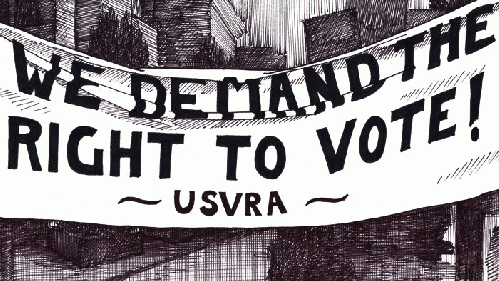The U.S. Government Has Failed. Increasingly dominated by a plutocracy composed of corporations and the wealthy elite, the two-party electoral system of the United States is almost completely dysfunctional. The parties do not produce viable candidates for the presidency, and the candidates do not address the most critical issues facing the Nation. Without a meaningful choice, voters are forced to select the lesser of two evils, or they give up and don't vote at all.
Both of the major political parties are controlled by the same powerful corporate and financial interests, and the policies of both parties benefit their corporate and wealthy sponsors rather than the People. Effectively, there is but one political party, with two branches with differing social views vying for control of Congress and the White House.
A Voice of the People survey conducted following the 2016 election identified the success of Trump's promise to "drain the swamp." While 9 in 10 voters, overall, believed that "elected officials think more about the interests of their campaign donors than the common good of the people," 99 percent of Trump voters said "the government is run for big interests rather than the people." Once elected, Trump installed the wealthiest and most corporate cabinet in history.
The government and those seeking elective office deliberately deceive the People into acting contrary to their interests. Truth, honor, and fair dealing have no place in the political process--only raw power and the benefits it confers on the rich and powerful.
The last time a similar crisis prevailed was following the Revolutionary War when the Articles of Confederacy governed the new United States. George Washington and other founders recognized that an entirely new government had to be created if the Nation they had fought for was to survive. He believed there was a delicate balance between things being sufficiently bad enough to force a change and being too bad to allow a change. Out of necessity, they created the Constitution and the Bill of Rights to transform their government into one that better served their needs. Americans are once again confronted with the same crisis.
Many different initiatives to repair various elements of the electoral system have been proposed, including the elimination of corporate constitutional rights. While efforts to eliminate corporate personhood and control campaign financing, would be beneficial, they would not ensure the right to cast effective votes--which is the essential requirement of a free and democratic republic.
The United States Voters' Rights Amendment (USVRA) is a comprehensive solution to these problems. Addressing the various issues that interfere with the ability of the People to cast effective votes, it will transform the government into a true representative democracy. The USVRA will reorient the priority of the government to the benefit of the People and their society.
People Making Policy. The whole concept of the USVRA stemmed from the idea that the People have an inherent right and ability to vote on the most critical issues facing them and their society, to articulate their own policies, and to elect the representatives who are most likely to follow those policies. This concept shifts policy formulation from the politicians to the People themselves.
From this, all other aspects of the USVRA evolved as being necessary to attain this goal. We will begin by examining what it means for the People to make their own policy, and in subsequent sections we will look at measures that transform that ideal into a reality.
Just as the law of supply and demand usually works to provide a product or service at the time and place it is needed, the collective wisdom of a group of informed and engaged voters is greater than that of any particular candidate seeking their vote. Irrespective of a candidate's intelligence, ethics, or qualifications, the voters' collective thinking will be more reliable and less subject to corruption.
The concept of "policy" is widely misunderstood. Policy is simply a guideline or a path to a goal or objective. It differs from laws, rules and regulations, which are mandatory.
Moreover, a policy referendum differs substantially from the initiatives and propositions that voters often find on their state and local ballots. A policy referendum does not make law"it creates political guidelines. Initiatives and propositions may not be the best way to make laws, but a referendum is an excellent way to make public policy.
Through their answers to referendum questions, voters can effectively establish policy guidelines to be followed and implemented by those they elect. We have repeatedly seen how necessary laws on matters such as fair taxation, gun control, and women's freedom of choice are often defeated by small, but powerful special interests. With the opportunity for a full and complete public discussion, an overwhelming vote by the People would compel their representatives to act according to the quiet wishes of a large majority of the voters, rather than the demands of a small, but vocal minority.
The USVRA compels Congress to identify the most critical policy questions for the People to answer and to place these questions on the national presidential ballot.
Failure of Congress to adopt a joint resolution containing the questions shall result in the disqualification of all sitting members of Congress to be eligible for reelection. In other words, all of them will automatically be out of a job if they fail to address the policy issues of concern to the People.
(Note: You can view every article as one long page if you sign up as an Advocate Member, or higher).






